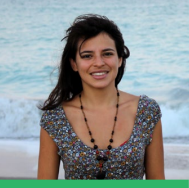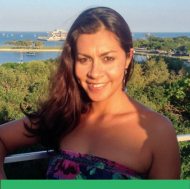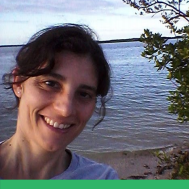20,000 Fellows Under the Sea
The Smithsonian Marine Station (SMS), Fl has a host of new fellows who are doing exciting things! The following is excerpted from the Summer 2015 SMS news update.
New Faces at SMS
Eva Galimany received her PhD in Biology from the University of Barcelona, where she investigated the feeding behavior of mussels in response to toxic phytoplankton. She joined SMS as a postdoctoral fellow in 2015 to lead experiments studying the ability of benthic filter feeders to deplete algal blooms in the northern Indian River Lagoon.

Juliana Lopez is a predoctoral fellow carrying out her PhD thesis in the tropical eastern Pacific region encompassing Costa Rica, Panama and Colombia. Juliana’s work focuses on the interaction between ecological, social and cultural characteristics of coastal communities, using social-ecological models to assess resilience and the effectiveness of marine protected areas.
 Postdoctoral fellow Jessica Lunt joined SMS in fall 2014 after receiving her PhD from Texas A&M University – Corpus Christi, where she focused on the effects of turbidity on oyster reef communities. At SMS, Jessica is part of the Northern IRL project, working to understand the impacts of environmental variability on the ability of epifaunal grazers to control algal blooms.
Postdoctoral fellow Jessica Lunt joined SMS in fall 2014 after receiving her PhD from Texas A&M University – Corpus Christi, where she focused on the effects of turbidity on oyster reef communities. At SMS, Jessica is part of the Northern IRL project, working to understand the impacts of environmental variability on the ability of epifaunal grazers to control algal blooms.

Postdoctoral fellow Iris Segura-Garcia earned a PhD in Molecular Ecology and Evolution at Durham University in the UK. She uses genetic tools to better understand the temporal variation in the settlement of early stages of ecologically and economically important marine species in Florida and countries along the Mesoamerica Reef system, including Mexico, Belize, and Honduras.
 SMS/Link Fellow Chelsea Metzgar is pursuing a Masters degree in Biology at the University in North Florida. While at SMS, she is isolating a chemical compound produced by turtle grass, Thalassia testudinum, and testing its ability to inhibit a pathogenic protist that causes seagrass wasting disease.
SMS/Link Fellow Chelsea Metzgar is pursuing a Masters degree in Biology at the University in North Florida. While at SMS, she is isolating a chemical compound produced by turtle grass, Thalassia testudinum, and testing its ability to inhibit a pathogenic protist that causes seagrass wasting disease.

Rachel Smith is a PhD student in the Odum School of Ecology at University of Georgia, where she is studying the physical, abiotic, and biotic factors that shape ecological communities. As an SMS/Link Fellow she is looking at the impacts of mangrove range expansion on the saltmarsh plants that live in the transitional zones.
 Alex Tilley is a postdoctoral fellow developing methods and tools to assess the vulnerability of fisher communities to management changes, and to model optimal conditions for fisheries sustainability, food security and livelihood protection. Alex’s primary project site is Myanmar, Southeast Asia, where the Smithsonian is working with the Department of Fisheries to build capacity for marine management.
Alex Tilley is a postdoctoral fellow developing methods and tools to assess the vulnerability of fisher communities to management changes, and to model optimal conditions for fisheries sustainability, food security and livelihood protection. Alex’s primary project site is Myanmar, Southeast Asia, where the Smithsonian is working with the Department of Fisheries to build capacity for marine management.
Check out their entire Summer 2015 Newsletter here.







